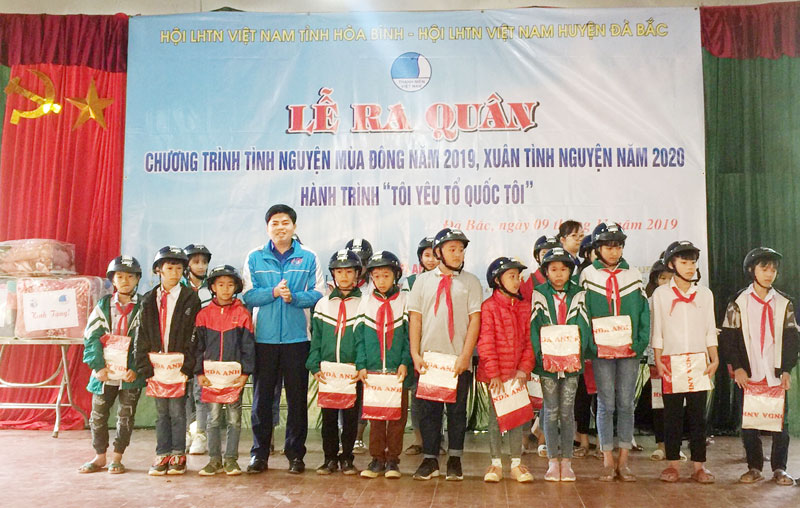
(HBO) - The youth federation of Hoa Binh province held a ceremony to launch the volunteering programme Winter 2019 and Spring 2020 and the journey “I love my Fatherland 2019” in Dong Chum commune, Da Bac district, on November 9.
 Officials
of the HCYU - Hoa Binh chapter and organisations present gifts to disadvantaged
students.
Officials
of the HCYU - Hoa Binh chapter and organisations present gifts to disadvantaged
students.
The ceremony was joined by officials of the
Ho Chi Minh Communist Youth Union (HCYU) - Hoa Binh chapter, youth federations of
the province and Da Bac district, along with more than 300 members of the HCYU
in the province.
Within the framework of the volunteering
programme Winter 2019 and Spring 2020 and the journey "I love my Fatherland
2019”, a series of practical activities are being organised by the provincial
youth federation. Particularly, the "Warm Winter for Children”, "Support for
Farmers”, "Actions for Public Health” and spring volunteering programme, among
others, have helped disadvantaged youths and children as well as the poor in
the locality.
They are among practical programmes
arranged by all levels of the provincial youth federation to welcome the
success of the sixth provincial youth federation’s congress for the 2019-2024
tenure.
At the launch event, the provincial youth federation
and sponsors handed over 35 sets of warm clothes and blankets, and joined hands
with the young doctor club to provide free medical checkups and medicine for
200 old people and children living in difficulties.
They also held counselling sessions and
helped 202 people receive their ID cards and teamed up with Honda HEAD’s dealer
Anh Ky to popularise traffic and safe rules for local residents, along with
arranging cleaning up activities, and so on./.
a
Hoa Binh province is undergoing a dynamic transformation amid Vietnam’s national digital transition. Building on Poliburo’s Resolution No. 57-NQ/TW on breakthroughs in science, technology, innovation, and national digital transformation, the province has rolled out a wide range of practical action plans. A standout initiative is the "Digital Literacy for All” movement, an effort to ensure that no one is left behind in the digital era.
Hoa Binh province is undergoing a dynamic transformation in the wake of the national digital transformation movement. Building on Resolution No. 57-NQ/TW of the Politburo on breakthroughs in science, technology, innovation, and national digital transformation, the province has implemented a wide range of practical action plans. A standout initiative is the "Digital Literacy for All” movement ambitious effort to ensure that no one is left behind in the digital age.
With a spirit of unity and proactive problem-solving, the Party Committee, the government and the people of Dong Lai Commune (Tan Lac District) have made great strides in implementing the resolutions of the 24th Party Congress of the commune for the 2020 - 2025 term. Focusing on leadership and practical actions, the commune has brought the Party’s resolutions into daily life, creating strong impacts and pushing the local development forward.
Amid the nationwide push for digital transformation, young people in Hoa Binh Province are stepping up as dynamic pioneers, applying technology to enhance Youth Union operations and expand the reach of youth-led initiatives. Through creativity and adaptability, Youth Union organizations at all levels have introduced a series of practical solutions, contributing to modern governance and community development.
In recent years, An Nghia commune, located in Lac Son district, has stepped up administrative reform, focusing on improving the quality and efficiency of its single-window service unit for receiving and processing administrative procedures. These improvements have helped create favourable conditions for local residents and organisations to handle administrative procedures, contributing to the commune’s broader socio-economic development.
The Prime Minister-approved master plan to develop the multi-use value of forests ecosystems through 2030, with a vision to 2050, aims to improve the management and sustainable use of forest resources, create jobs, increase incomes, and improve the living standards of ethnic minorities, people in mountainous and remote areas, forest workers and those living near forests.



 Officials
of the HCYU - Hoa Binh chapter and organisations present gifts to disadvantaged
students.
Officials
of the HCYU - Hoa Binh chapter and organisations present gifts to disadvantaged
students.